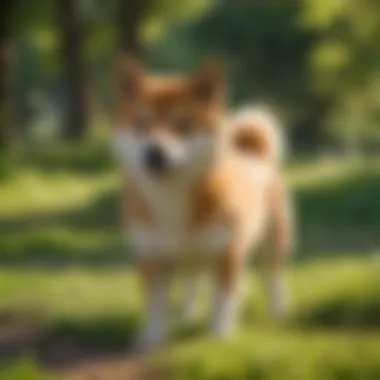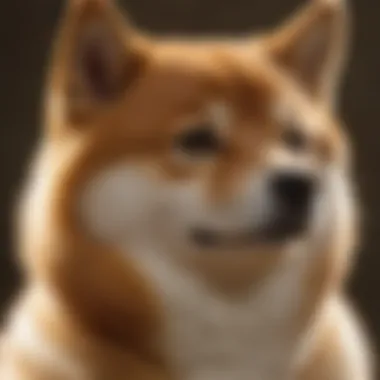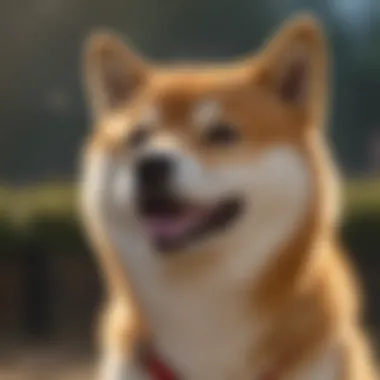Caring for Your Shiba Inu: A Comprehensive Guide


Intro
The Shiba Inu is a breed that captivates the hearts of many dog lovers with its unique personality and charming appearance. Originally hailed from Japan, this breed is known for its spirited demeanor and fox-like features. They embody independence, intelligence, and an unyielding loyalty to their owners, making them truly remarkable companions. In this guide, we will explore essential aspects of caring for a Shiba Inu, from understanding their characteristics to catering for their health and grooming needs. This thorough examination is structured to support both current and potential Shiba Inu owners, as well as animal enthusiasts eager to deepen their knowledge about this engaging breed.
Understanding the Shiba Inu goes beyond mere aesthetic appreciation; it involves a commitment to their care and well-being. This dog breed has specific needs that, when recognized and respected, lead to happier, healthier dogs. Familiarizing yourself with these requirements can greatly enhance your experience as a Shiba Inu owner. Let's delve into the significant aspects of their care, starting with an overview of the breed.
Prolusion to Shiba Inu Care
Caring for a Shiba Inu requires a thoughtful approach, one that reflects their unique traits and behaviors. Understanding the basic needs and characteristics of this breed can significantly improve the quality of life for both the pet and the owner. This section anchors the entire article, highlighting the importance of tailored care practices that suit the spirited nature of Shiba Inus.
Understanding the Breed
The Shiba Inu is a breed deeply rooted in history, originally from Japan. They are known for their fox-like appearance, compact size, and distinctive curled tail. Characteristically, Shiba Inus possess a strong sense of independence, often exhibiting a personality that blends affection with stubbornness. This means they may not always follow commands readily, requiring patience and consistent training methods from their owners.
Their intelligence can be both an asset and a challenge. While they can be quick learners, they tend to be selective about what they want to learn. Owners of Shiba Inus should be prepared for a dog that enjoys mental stimulation but may not respond well to repetitive training exercises. Understanding these traits is crucial for fostering a positive relationship with this breed.
Why Proper Care is Important
Proper care for a Shiba Inu goes beyond merely feeding and grooming. It encompasses a holistic view that involves understanding their behavioral needs, health considerations, and socialization. Each element plays a crucial role in the well-being of Shiba Inus.
"Thorough knowledge about breed specifics can lead to a harmonious companionship between dogs and their owners."
When Shiba Inus are provided with the appropriate care, they thrive both mentally and physically. Ignoring their needs can result in behavioral issues, health complications, and an overall lack of fulfillment. Key areas to focus on include:
- Diet and Exercise: Adequate nutrition and regular physical activity help in maintaining their energy levels and preventing obesity.
- Socialization: Regular interaction with other pets and people is vital, as Shiba Inus can display aloofness if not properly socialized.
- Health Check-Ups: Routine veterinary visits can preempt potential health issues, ensuring the long term health of the dog.
Understanding the significance of proper care helps create a nurturing environment where Shiba Inus can flourish. This detailed comprehension will serve as a solid foundation for other sections in this guide.
Basic Needs of Shiba Inu
Caring for a Shiba Inu involves understanding their basic needs. These needs are not just about feeding and sheltering; they involve a holistic approach to their health and happiness. Addressing these essentials ensures a vibrant and well-adjusted pet. Owners must prioritize each of these aspects to foster a lasting companionship with their Shiba Inu.
Dietary Requirements
High-Quality Dog Food
A crucial element in your Shiba Inu’s diet is high-quality dog food. This type of food contains essential nutrients that support growth, energy levels, and overall health. It is often packed with proteins sourced from real meat rather than by-products. A significant characteristic of high-quality dog food is its ingredient transparency. This allows owners to make informed decisions about what their dog consumes.
The unique feature of high-quality dog food is its optimal balance of proteins, fats, and carbohydrates, which can lead to healthier skin and coat. However, not all brands offer the same level of quality, so careful selection is needed to avoid poor choices that may not meet nutritional standards.
Portion Control
Portion control plays a significant role in maintaining your Shiba Inu’s health. This practice helps prevent obesity, which is a common issue in the breed due to their reluctance to exercise sometimes. A key characteristic here is customizing serving sizes based on age, weight, and activity level.
Implementing portion control can be a beneficial choice as it establishes a routine and avoids overfeeding. However, strict adherence is necessary as it can lead to nutritional deficiencies if not managed properly in relation to the type of food provided.
Special Dietary Needs
Some Shiba Inus may have special dietary needs due to allergies or health conditions. Being aware of these aspects is crucial for maintaining their well-being. Special dietary needs require close monitoring and potentially, a switch to specialized food products. The key characteristic of this consideration is its personalization based on individual dog’s health requirements.
Addressing special dietary needs is a valuable approach when it comes to preventing discomfort or serious health issues. This, however, may require consultation with a veterinarian, particularly for allergies, which can complicate diet management.
Exercise and Activity Levels
Daily Exercise Needs
Daily exercise is vital for the Shiba Inu's physical and mental well-being. These dogs are known for their energetic nature, making it important to provide them with regular physical activity. A defining feature of daily exercise needs includes structured playtime and walks. How often and how long these sessions occur may depend on the dog's age and energy level.
Incorporating daily exercise is a beneficial aspect of ownership. It stimulates their mind and prevents destructive behavior that arises from boredom. However, it is essential to know how much is enough, as excessive exercise can lead to injuries.


Outdoor Activities
Outdoor activities serve not only as a form of exercise but also enrich your Shiba Inu's life. These activities may include engaging in agility courses, hiking, or even socializing with other dogs. A notable characteristic of outdoor activities is their ability to mentally stimulate the dog while providing great physical exercise.
Participating in outdoor activities can enhance the bond between owner and dog. Such interactions can also prevent behavioral problems that stem from a lack of stimulation. However, it is vital to ensure that these outings are safe and controlled to prevent accidents or runaways.
Obedience Training
Obedience training should not be an afterthought when considering a Shiba Inu's activity level. This training helps instill discipline and good behavior, which are essential for a harmonious home environment. A key aspect of this training is consistency and positive reinforcement. Shiba Inus can be independent thinkers, making structured training sessions necessary.
Obedience training is beneficial as it enhances communication between you and your pet, making daily interaction smoother. Yet, challenges may arise if the training is not approached in a consistent and patient manner, leading to frustration on both sides.
Health Considerations for Shiba Inu
When it comes to caring for Shiba Inu, prioritizing health considerations is crucial. This section explores the unique aspects of Shiba Inu health, emphasizing the necessity of addressing common concerns and preventative measures. Owners who are informed about the breed's specific health issues can make better decisions that will enhance their pet's quality of life.
Common Health Issues
Genetic Conditions
Shiba Inu are generally healthy dogs, but like all breeds, they can be prone to certain genetic conditions. The most prevalent issues include hip dysplasia and patellar luxation. Understanding these genetic conditions enables owners to be proactive.
It is essential to recognize early signs of discomfort or mobility issues. Investing time in breeding knowledge helps ensure that puppy owners select healthy candidates from responsible breeders. Regular screening and genetic testing can also help in preventing potential health issues.
Prevention Strategies
Developing strong prevention strategies is vital to maintain your Shiba Inu's health. This involves a combination of regular exercise, appropriate diet, and monitoring for typical health problems. Maintaining a healthy weight is especially important. Being overweight can exacerbate existing conditions.
Routine health checks and early intervention can thwart minor issues before they escalate into serious concerns. Preventative care can save owners money and heartache in the long run.
Regular Vet Check-ups
Regular veterinary check-ups should be a priority for Shiba Inu owners. These visits enable vets to conduct thorough examinations, including vaccinations and screenings. An annual exam can identify underlying health issues that may otherwise go unnoticed.
Building a relationship with a veterinarian who understands the breed can make these visits smooth. It also ensures that owners are informed about the latest treatment options and interventions available for their dogs.
Vaccination and Preventative Care
Vaccination and preventative care are essential components of Shiba Inu health management. Ensuring that your dog is up-to-date on vaccinations protects against common illnesses that can affect their well-being. Additionally, preventative care goes hand-in-hand with responsible pet ownership.
Vaccination Schedule
A proper vaccination schedule is integral in the first year of your Shiba Inu's life. Puppies should receive core vaccinations at specific intervals to build immunity against diseases such as distemper or parvovirus. Staying on top of these vaccines ensures long-term health and can reduce veterinary costs over a lifetime.
Parasite Control
Managing parasite control is mandatory for a healthy Shiba Inu. This includes vaccinations against fleas, ticks, and worms, which can lead to further health complications. Failing to maintain a parasite control regimen can result in weight loss, skin issues, and sometimes serious diseases. Regular treatments and monitoring can help prevent infestations.
Importance of Spaying/Neutering
Deciding to spay or neuter your Shiba Inu can influence its health in several ways. Spaying reduces the risk of certain reproductive cancers, while neutering may help with behavioral issues. Both options reduce the risk of overpopulation. Discuss with your veterinarian the best timing and methods for spaying or neutering.
"Proper health care not only extends a dog's life but also enriches their daily existence."
In summary, a comprehensive understanding of Shiba Inu health considerations is fundamental. By addressing common health issues, implementing effective prevention strategies, and following a robust vaccine and parasite control schedule, you can significantly enhance your furry friend's quality of life.
Grooming a Shiba Inu
Grooming is crucial for Shiba Inus, both for their appearance and their overall health. This breed has a double coat that requires regular attention to keep it clean, healthy, and free of mats. Proper grooming also contributes to their comfort and well-being. Regular grooming can minimize shedding, control odors, and help detect potential health issues early.
Coat Care and Shedding


Brushing Techniques
Brushing techniques are essential for maintaining the Shiba Inu's coat. Daily brushing helps remove loose fur and dirt, which can prevent matting. A slicker brush or undercoat rake is often recommended due to its ability to penetrate the dense fur. This technique ensures that the undercoat is well-groomed as well. It also promotes better skin circulation, which contributes to healthier fur.
Seasonal Shedding
Shiba Inus experience seasonal shedding. This occurs typically during the spring and fall, when they shed their undercoats to regulate their body temperature. Understanding this cycle helps owners prepare for increased hair around the home. During these shedding periods, more frequent brushing is beneficial. It can control the hair fallout and maintain a cleaner living space. Not addressing seasonal shedding can lead to discomfort for the dog.
Bathing Frequency
Bathing frequency for Shiba Inus should be moderate, roughly every 6 to 8 weeks. Over-bathing can strip natural oils, leading to dry skin. When bathing, use a gentle shampoo made for dogs to avoid skin irritation. Bathing helps to remove dirt and odors, keeping the dog's coat looking its best. However, understanding their skin and coat is essential to determine if adjustments are needed.
Nail Care and Ear Cleaning
Trimming Techniques
Trimming techniques are vital for maintaining healthy nails in Shiba Inus. Regular trims, every 3 to 4 weeks, prevent nails from becoming too long, which can lead to discomfort when walking. Using a proper nail clipper or grinder is important to avoid hurting the dog. Skillful trimming prevents split nails or over-cutting into the quick, which can be painful.
Signs of Ear Infection
Recognizing signs of ear infection is crucial for the health of a Shiba Inu. Symptoms may include constant scratching at ears, redness, or an unusual odor. Early recognition is beneficial in preventing further issues. Regular ear examinations can help maintain ear health, especially when combined with routine cleaning.
How Often to Clean
How often to clean the ears can vary. Typically, cleaning every two weeks is recommended, but it might need adjustment based on the individual dog. Over-cleaning can irritate the ears, while under-cleaning can lead to build-up and infections. Using a dog-friendly ear cleaner can make this process simpler and more effective.
Behavior and Socialization
Behavior and socialization are vital components of Shiba Inu care. Understanding a Shiba Inu's behavior traits helps owners to respond appropriately to their needs. Additionally, proper socialization teaches these dogs how to interact with other pets and people respectfully. A well-socialized Shiba Inu is more likely to engage positively within various environments.
Understanding Behavior Traits
Independent Nature
The independent nature of Shiba Inu is one of their most defining characteristics. This breed often exhibits a strong sense of autonomy. This can be both a strength and a challenge for owners. It allows Shiba Inus to be quite self-sufficient which can be beneficial if owners are busy. However, it also means they may not always listen or follow commands without proper training.
Intelligence
Intelligence plays a significant role in the Shiba Inu's behavior. They are considered one of the smarter breeds, capable of learning commands quickly. This intelligence allows them to engage in various activities, enhancing their overall well-being. However, with this intellectual capability comes a potential challenge—owners may face difficulties if they do not provide adequate mental stimulation. Boredom can lead to unwanted behaviors, such as chewing or digging.
Vocalization Patterns
Vocalization patterns are another important aspect of Shiba Inu behavior. This breed can be quite vocal, often expressing their feelings with various sounds. Understanding these patterns can help owners interpret their dog's mood. It enriches the communication between the owner and the dog. However, excessive barking may become a concern if not managed. Training can address this before it becomes a habit.
Socialization with Other Pets
Socialization with other pets is crucial for Shiba Inu. It allows them to learn how to behave properly in the presence of others. When introducing new pets, it is essential to manage the encounter carefully. Gradual introductions can facilitate a smoother transition.
Introducing New Pets
Introducing new pets to a Shiba Inu needs careful execution. The key is to do so slowly and under controlled conditions. This ensures that the Shiba Inu feels safe and does not feel threatened. Positive reinforcement during this time can help create a positive experience. Failure to introduce new pets appropriately may result in aggression or territorial behavior.
Handling Aggression
Handling aggression in a Shiba Inu is important for a harmonious home. This breed may show aggression if they feel scared or threatened. Understanding triggers is vital in managing these responses. A calm approach is essential during training sessions, helping to foster a sense of security. Professional guidance may be beneficial for owners struggling with aggression issues.
Importance of Early Socialization
Early socialization is crucial for the Shiba Inu's behavioral development. Exposing them to various experiences, people, and other animals during their early months promotes well-rounded behavior. This can prevent behavioral issues as they grow older. Implementing socialization techniques at a young age sets the foundation for a confident, friendly dog.
Creating a Comfortable Living Environment


Creating a comfortable living environment for your Shiba Inu is essential for their well-being and happiness. This breed is known for its spirited personality and strong independence. Therefore, providing them with a space that meets their needs will contribute significantly to their overall health and behavior. Additionally, a well-considered living area can help in reducing anxiety and ensuring they feel secure in their surroundings.
Space Requirements
Indoor Space Considerations
Indoor space is pivotal for your Shiba Inu's comfort. A spacious home allows them to roam freely while ensuring they have a safe environment. Shiba Inus are energetic dogs that appreciate having enough room to play. A key characteristic of this is giving them a designated area for their toys and activities. This not only contributes to their physical health but also their mental stimulation.
One unique feature of indoor space considerations is the setup of your living room or play area. You should ensure that valuable items are out of reach and that there are no small objects that they could swallow. The layout must also allow easy movement for both the owner and the pet. This creates a safe haven for your Shiba Inu, promoting a positive atmosphere.
Outdoor Needs
Outdoor space is equally important for your Shiba Inu. They thrive in environments where they can explore and exercise. A securely fenced yard provides a safe area for free play. Also, outdoor exposure is critical for their emotional and physical needs, reducing feelings of boredom and helping prevent behavioral issues.
The key characteristic of outdoor needs is an area that encourages activity and exploration. This aligns with their natural instincts. However, it is important to note that an unregulated outside space can present risks, such as escape or encounters with wildlife. Thus, a fenced area with proper features significantly increases their safety and comfort.
Hoteling Your Shiba Inu
Hoteling your Shiba Inu refers to making their space a comfortable resting area. This ensures they have a peaceful and cozy spot to retreat after play. Utilizing luxurious bedding and providing an area that feels secure can greatly enhance their living experience.
A key characteristic is the creation of a separate, quiet space where they can feel at ease. This can aid in alleviating stress, especially during noisy or busy times. Properly designed hoteling areas also come with advantages, like reducing anxiety and promoting restful sleep. However, make sure it is not too isolated from the family environment to prevent feelings of loneliness or abandonment.
Safety Precautions
Ensuring a safe environment goes hand in hand with creating comfort. Addressing potential risks in your home is crucial for the health of your Shiba Inu.
Secure Fencing
Secure fencing is one of the most effective measures to keep your Shiba Inu safe. It prevents them from running away and protects them from potential dangers. Given that Shiba Inus are agile, investing in sturdy, high fencing is highly recommended.
A key characteristic of secure fencing is its height and penetrating abilities. Ideally, a fence should be higher than their jumping capacity, and it should be deep enough to prevent digging under. This is beneficial because it provides a reliable boundary that keeps them contained.
Pet-Proofing Your Home
Pet-proofing your home involves removing hazards that could harm your Shiba Inu. This includes securing loose electrical wires and ensuring that poisonous plants are out of reach. Furthermore, it’s vital to keep cleaning supplies and small objects stored safely.
The main aspect of pet-proofing is strategic layout and organization. This not only promotes safety but also encourages a more functional living space. A well-proofed home leads to peace of mind for the owner and increases the overall quality of life for the dog.
Identifying Hazardous Materials
Identifying hazardous materials is critical to maintain a safe living environment. This involves keeping track of items that pose a risk to your Shiba Inu, such as certain plants, human food, and chemicals. Regularly monitoring the surroundings ensures that no harmful substances are within their reach.
The key characteristic of this task is vigilance. Taking the time to recognize these hazards prevents accidents and is ultimately a responsible aspect of pet ownership. Furthermore, establishing a habit of checking your home for risks can facilitate a safe space for your Shiba Inu, enabling them to thrive.
The End
In caring for your Shiba Inu, it is crucial to understand various elements that contribute to their well-being. The comprehensive guide evaluates important factors like diet, exercise, health, grooming, and socialization. These aspects combine to create a balanced lifestyle that not only meets their physical requirements but also supports their mental and emotional health.
The guide emphasizes that proper care is not just a one-time effort, but a continuous journey. It allows owners to be aware of the significant responsibilities that come with owning a Shiba Inu. This breed, known for its spirited nature, benefits greatly from adequate training, socialization, and healthcare. Owners who commit to this task can unlock the true essence of their Shiba Inu’s character.
"A well-cared-for Shiba Inu is not just a pet, but a thoughtful companion that enriches your life."
Recap of Key Points in Shiba Inu Care
Reflecting on the discussed topics, it’s noteworthy that caring for a Shiba Inu encompasses several critical areas:
- Understanding the Breed: Knowing their traits aids in better handling and training.
- Dietary Requirements: Providing high-quality food and considering portion control fosters good health.
- Health Care: Regular check-ups and vaccinations help prevent common diseases.
- Grooming Needs: Implementing a proper grooming routine minimizes shedding and promotes cleanliness.
- Behavior and Socialization: Engaging your dog with other pets and people is vital for a balanced temperament.
- Living Environment: Ensuring adequate space and safety ensures a comfortable ambiance for your pet.
Each point integrates into a larger picture demonstrating that attentive care forms the foundation of a healthy, happy relationship with a Shiba Inu.
The Ongoing Commitment to Their Well-Being
Caring for a Shiba Inu demands ongoing dedication. This commitment extends beyond the initial stages of ownership. As Shiba Inus grow and evolve, their needs may change. Staying informed about behavioral trends, health updates, and grooming practices is essential.
Moreover, the bond between owner and dog deepens through consistent engagement. Investing time in training, offering mental stimulation, and establishing a routine benefits not only the pet but also builds a stronger relationship. Keeping abreast of veterinary health advice, seasonal care guidelines, and behavioral studies enhances your effectiveness as a responsible owner.
In summary, the journey of caring for a Shiba Inu may be challenging yet rewarding. The unique traits of this breed can flourish in a loving environment that prioritizes their needs and happiness.







